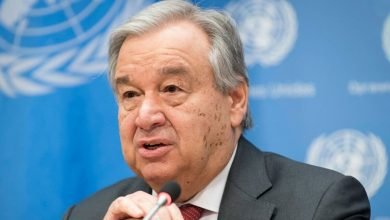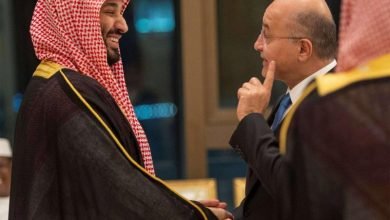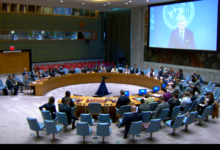US Yemen envoy exposes Iran’s ‘lethal’ support for Houthis

SMA NEWS – NEW YORK
Iran’s support for Yemen’s Houthi militias is “quite significant and it’s lethal,” US Special Envoy for Yemen Tim Lenderking said on Wednesday, as he called a battle for Yemen’s gas-rich Marib region the single biggest threat to peace efforts.
“We would welcome Iran playing a constructive role, if they are willing to do so. We have not seen any indication of that,” Lenderking said.
Lenderking told US lawmakers that Iran supports the Houthis in several ways including through training, providing lethal support and helping them “fine tune” their drone and missile programmes.
“Unfortunately all of this is working to very strong effects as we see more and more attacks on the Kingdom of Saudi Arabia – and potentially other countries – more accuracy and more lethality. So this is a great concern to us,” Lenderking told a House of Representatives Foreign Affairs Committee hearing.
“Iran’s support to the Houthis is quite significant, and it’s lethal,” Lenderking said.
A Saudi Arabia-led military coalition intervened in Yemen in 2015 after the Iran-aligned Houthi militias ousted the country’s government from the capital Sana’a. The Houthis have said they are fighting a corrupt system.
“We would welcome Iran playing a constructive role, if they are willing to do so. We have not seen any indication of that,” Lenderking said.
Iran-US tensions
Iran has denied supporting the Houthis. A spokesman for Iran’s mission to the United Nations in New York dismissed Lenderking’s remarks as unsubstantiated claims against Iran.
“Iran has, time and again called for a peaceful settlement of the conflict in Yemen,” the Iranian spokesman said.
“In contrast, the US has been providing the deadliest weapons to those who are using them to kill innocent men, women and children on a daily basis.”
US President Joe Biden said in February that Washington was ending all American support for the Saudi-led offensive operations in Yemen, including relevant arms sales.
Since taking office in January, Biden has made Yemen a priority and appointed Lenderking to help revive stalled UN efforts to end a conflict widely seen as a proxy war between rivals Saudi Arabia and Iran.
“What I see is continued aiding and abetting an army of Houthis by the Iranians so that they can continue attacking Saudi Arabia, and unfortunately those attacks have risen quite strongly in the last couple of months,” Lenderking told a Senate Foreign Relations subcommittee hearing later on Wednesday.
The United States should “leave the matter of finding a resolution to the senseless conflict in the capable hands of the regional countries,” the Iranian UN mission spokesman said.
Escalating violence
Fighting has intensified in recent days as the Houthis push their offensive to take Marib, which if successful would strengthen the movement’s hand in any future political negotiations.
“This offensive is the single biggest threat to peace efforts and is also having devastating humanitarian consequences. If we do not stop the fighting in Marib now, it will trigger a wave of even greater fighting and instability,” Lenderking said.
There are about 70,000 US citizens living in neighbouring Saudi Arabia, Lenderking said, and “it is our greatest fear that Americans will be killed in a Houthi attack.”
Saudi state media said Thursday the coalition battling Houthis has intercepted a drone attack on the southern Saudi city of Khamis Mushait.
The Houthis’ military spokesman said in a Twitter post that the militias fired a drone on a military base in Khamis Mushait.
The Houthis have stepped up cross-border drone and missile attacks on Saudi cities.
The coalition says it intercepts the majority of assaults.

Houthi push for Marib complicates US ceasefire efforts
US envoy Tim Lenderking and UN envoy Martin Griffiths have been touring the region for discussions to try to break the deadlock and secure a ceasefire, but so far without success.
The battle for Yemen’s gas-rich Marib region is complicating US efforts to reach a ceasefire needed to end a six-year-old war and secure a foreign policy win for President Joe Biden, two sources familiar with the talks and a diplomat said.
A UN/US peace initiative presented by Saudi Arabia in March proposed a nationwide ceasefire and the reopening of air and sea links, to bolster efforts to end a devastating conflict widely seen as a proxy war between Saudi Arabia and Iran.
Riyadh, which leads a military coalition battling Yemen’s Houthi militias, has been under increasing pressure to end the war since Biden signalled Washington would no longer support the intervention and as the United Nations warns of looming famine.
But the initiative has been stuck since Yemen’s Iran-aligned Houthis made a series of counter-proposals, including for a phased truce that could allow them sufficient time to seize Marib, the Saudi-backed government’s last northern stronghold.
Potentially crippling the peace initiative, fighting has intensified in recent days as the Houthis push their offensive to take Marib, which if successful would strengthen the movement’s hand in any future political negotiations.
“Probably the Houthis, given a choice between a ceasefire and taking Marib, would choose to take Marib,” said a senior diplomat based in the region.
The peace initiative can only be saved by a “mutually hurting stalemate” in which Houthi losses reach a point where they lose tribal support, the diplomat said, adding the group has replaced seasoned fighters lost to coalition bombs with inexperienced youths.
Impasse
US envoy Tim Lenderking and UN envoy Martin Griffiths have been touring the region for discussions to try to break the deadlock and secure a ceasefire, but so far without success.
The UN/US initiative would reopen Sana’a airport and allow fuel and food imports through Hodeidah port, both of which are controlled by the Houthis. But the movement said last month that these steps would not go far enough.
Two people involved in the talks said the main issue now is sequencing, since the Houthis insist on a full lifting of the blockade followed by a gradual ceasefire: a halt to Houthi attacks on Saudi Arabia and coalition airstrikes on Yemen and then a truce with Yemen’s government.
Coalition airstrikes are the only thing keeping Marib, home to major oil and gas fields, from falling, since Houthi forces, now 15 km (9 miles) west of the city, have more advanced weaponry than pro-government troops, military sources said.
Hundreds of fighters from both sides have been killed in the desert plain, but military and local sources say the Houthis have lost more in the war’s most deadly clashes since 2018.
The Houthis, who seized swathes of Yemen’s conventional military when they ousted the government from the capital Sana’a in late 2014, have sent thousands of fighters to the Kasara and Mushaja areas near Marib city whose terrain provides some cover, pro-government military and local sources said.
The fighting has displaced some 13,600 people in the region since February, according to the United Nations, which said four refugee camps were shut after being hit by shelling, injuring dozens and compounding overcrowding.
Marib hosts a quarter of Yemen’s four million refugees.
The war has killed tens of thousands of people in Yemen and caused what the United Nations describes as the world’s largest humanitarian crisis with millions facing famine.
But Saudi Arabia has also felt the impact of the war. It has faced a barrage of Houthi drone and missile strikes and is seeking security guaranties along its border as it tries to contain the influence of arch-rival Iran.
A question of timing
Saudi and Iranian officials discussed Yemen during direct talks this month aimed at easing tensions, six years after diplomatic ties were severed, sources said.
Michael Knights, an expert on Gulf military affairs with the Washington Institute for Near East Policy, said Saudi Arabia has enough reserves of US-supplied precision-guided munitions to keep defending Marib, but time remained a factor.
The Houthis, who already control most big urban centres, have a window of time to press their offensive during hazy summer weather that reduces coalition air operations.
“If the Houthis take it, (Marib) they’re going to take it in the next three months,” Knights said, adding that the group is advancing in pulses to seize ground and reinforce positions.
“The Houthis view Marib as a knockout blow. It makes them into a state with resources, a coastline, and most of the population. Whereas if you’re (Saudi-allied Yemeni president) Hadi, it knocks you out of the game,” he added.







